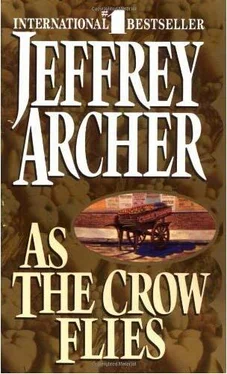Charlie set about supervising everything, from the exact siting of the one hundred and eighteen departments to the color of the twenty-seven acres of carpet, from the speed of the twelve lifts to the wattage of the one hundred thousand light bulbs, from the displays in the ninety-six windows to the uniforms of over seven hundred employees, each of whom displayed a little silver barrow on his lapel.
Once Charlie realized how much storage space he would need, not to mention facilities for an underground car park—now so many customers had their own vehicles, the costs went considerably over budget. However, the contractors somehow managed to complete the building by 1 September 1949, mainly because Charlie appeared on the site at four-thirty every morning and often didn't go back home much before midnight.
On 18 October 1949 the Marchioness of Wiltshire, escorted by her husband, performed the official opening ceremony.
A thousand people raised their glasses once Daphne had declared the building open. The assembled guests then did their best to eat and drink their way through the company's first year's profits. But Charlie didn't seem to notice; he moved happily from floor to floor checking that everything was exactly as he expected it to be and made sure that the major suppliers were being properly looked after.
Friends, relations, shareholders, buyers, sellers, journalists, hangers-on, gatecrashers and even customers were celebrating on every floor. By one o'clock Becky was so tired that she decided to start looking for her husband in the hope that he might agree to go home. She found her son in the kitchen department examining a refrigerator that would have been too large for his room in Trinity. Daniel assured his mother that he had seen Charlie leaving the building about half an hour before.
"Leaving the building?" Becky said, in disbelief. "Surely your father wouldn't have gone home without me?" She took the lift to the ground floor and walked quickly towards the main entrance. The doorman saluted her as he held open one of the massive double doors that led out onto Chelsea Terrace.
"Have you seen Sir Charles, by any chance?" Becky asked him.
"Yes, m'lady." He nodded in the direction of the far side of the road.
Becky looked across to see Charlie seated on his bench, an old man perched by his side. They were chatting animatedly as they stared across at Trumper's. The old man pointed at something that had attracted his attention and Charlie smiled. Becky quickly crossed the road but the colonel had sprung to attention long before she had reached his side.
"How lovely to see you, my dear," he said as he leaned forward to kiss Becky on the cheek. "I only wish Elizabeth had lived to see it."
"As I understand it, we're being held to ransom," said Charlie. "So perhaps it's time we took a vote on the issue."
Becky looked around the boardroom table, wondering which way the vote would fall. The full board had been working together for three months since Trumper's had opened its doors to the public, but this was the first major issue on which there had been any real disagreement.
Charlie sat at the head of the table, looking unusually irritable at the thought of not getting his own way. On his right was the company secretary, Jessica Allen. Jessica did not have a vote but was there to see that whenever a vote occurred it would be faithfully recorded. Arthur Selwyn, who had worked with Charlie at the Ministry of Food during the war, had recently left the civil service to replace Tom Arnold on his retirement as managing director. Selwyn was proving to be an inspired choice, shrewd and thorough, while being the ideal foil to the chairman as he tended to avoid confrontation whenever possible.
Tim Newman, the company's young merchant banker, was sociable and friendly and almost always backed Charlie, though he was not averse to giving a contrary view if he felt the company finances might suffer. Paul Merrick, the finance director, was neither sociable nor friendly and continued to make it abundantly clear that his first loyalty would always be to Child's Bank and its investment. As for Daphne, she rarely voted the way anyone might expect her to, and certainly was no placeman for Charlie or anyone else, for that matter. Mr. Baverstock, a quiet, elderly solicitor who represented ten percent of the company stock on behalf of Hambros, spoke rarely, but when he did everyone listened, including Daphne.
Ned Denning and Bob Makins, both of whom had now served Charlie for nearly thirty years, would rarely go against their chairman's wishes, while Simon Matthews often showed flashes of independence that only confirmed Becky's initial high opinion of him.
"The last thing we need at the moment is a strike," said Merrick. "Just at a time when it looks as if we've turned the corner."
"But the union's demands are simply outrageous," said Tim Newman. "A ten-shilling raise, a forty-four-hour week before overtime becomes automatic—I repeat, they're outrageous."
"Most of the other major stores have already agreed to those terms," interjected Merrick, consulting an article from the Financial Times that lay in front of him.
"Chucked the towel in would be nearer the mark," came back Newman. "I must warn the board that this would add to our wages bill by some twenty thousand pounds for the current year and that's even before we start to consider overtime. So there's only one group of people who will suffer in the long run, and that's our shareholders."
"Just how much does a counter assistant earn nowadays?" asked Mr. Baverstock quietly.
"Two hundred and sixty pounds a year," said Arthur Selwyn without having to check. "With incremental raises so that if they have completed fifteen years' service with the company, the sum could be as high as four hundred and ten pounds a year."
"We've been over these figures on countless occasions," said Charlie sharply. "The time has come to decide—do we stand firm or just give in to the union's demands?"
"Perhaps we're all overreacting, Mr. Chairman," said Daphne, who hadn't spoken until then. "It may not prove to be quite as black or white as you imagine."
"You have an alternative solution?" Charlie made no attempt to hide his incredulity.
"I might have, Mr. Chairman. First, let's consider what's at stake if we do give our staff the raise. An obvious drain on resources, not to mention what the Japanese would call 'face.' On the other hand, if we don't agree to their demands, it's possible that we might lose some of the better as well as the weaker brethren to one of our main rivals."
"So what are you suggesting, Lady Wiltshire?" asked Charlie, who always addressed Daphne by her title whenever he wished to show he didn't agree with her.
"Compromise, perhaps," replied Daphne, refusing to rise. "If Mr. Selwyn considers that to be at all possible at this late stage. Would the trade unions, for example, be willing to contemplate an alternative proposal on wages and hours, drawn up in negotiation with our managing director?"
"I could always have a word with Don Short, the leader of USDAW, if the board so wishes," said Arthur Selwyn. "In the past I've always found him a decent, fair-minded man and he's certainly shown a consistent loyalty to Trumper's over the years."
"The managing director dealing direct with the trade union's representative?" barked Charlie. "Next you'll want to put him on the board."
"Then perhaps Mr. Selwyn should make an informal approach," said Daphne. "I'm confident he can handle Mr. Short with consummate skill."
"I agree with Lady Wiltshire," said Mr. Baverstock.
"Then I propose that we allow Mr. Selwyn to negotiate on our behalf," continued Daphne. "And let's hope he can find a way of avoiding an all-out strike without actually giving in to everything the unions are demanding."
Читать дальше












